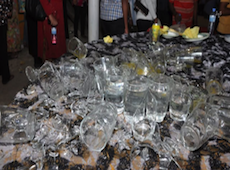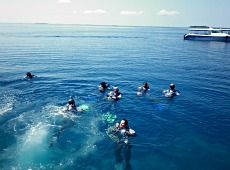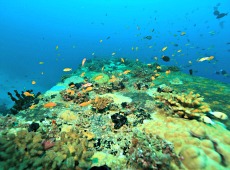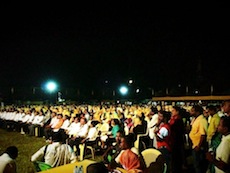In January 2013, parliament’s Government Oversight Committee heard testimony from six of the highest-ranking officers of the police and military for its review of the Commission of National Inquiry’s (CoNI’s) report into the transfer of presidential power on February 7, 2012. Minutes of the closed-door sessions (Dhivehi) along with audio recordings were made public on January 16, 2013.
Following is a translated summary of the testimony from former Commissioner of Police Ahmed Faseeh to the oversight committee on January 11, 2013. Faseeh retired from the police service shortly after President Mohamed Nasheed’s resignation.
Three or four nights before February 6, 2012, opposition coalition protesters at the Maldives Monetary Authority (MMA) building area took to the streets and began marching through the narrow roads of the capital. At the time, the demonstrations were taking place every night in front of the MMA building, after which the protesters would march across Male’ until the early hours of morning.
On the night in question, about 800 people were gathered at the Maldivian Democratic Party (MDP) Haruge (meeting hall) on Ameenee Magu. Fearing a possible confrontation, Faseeh asked his commanders to make sure that the opposition protesters do not reach Haruge.
While he was inside the police headquarters, Faseeh suddenly heard a platoon of Specialist Operations (SO) riot police take off on a police vehicle.
Acting without orders, the SO platoon stormed Haruge and pepper-sprayed ruling party supporters.
Faseeh called Defence Minister Tholhath Ibrahim and asked for a platoon of soldiers to be sent to the area to control the situation. The SO officers left Haruge when the military platoon arrived.
Following the SO attack on Haruge, two groups of MDP activists led by MPs Alhan Fahmy and ‘Reeko’ Moosa Manik made their way to the Supreme Court building and MMA area. With no command from senior officers, SO officers forcibly broke up the group led by Reeko Moosa as soon as they reached the MMA building.
The next morning, then-head of police intelligence, Chief Superintendent Mohamed ‘MC’ Hameed, informed Faseeh of an intercepted phone call between a SO lance corporal and Progressive Party of Maldives (PPM) MP Ahmed Mahloof. The call was intercepted and shared by military intelligence.
In the recorded phone call, the SO officer boasts of pepper spraying people at Haruge and beating up MDP activists when they came to the MMA area. MP Mahloof asks the lance corporal why they did not break MP Moosa Manik’s leg.
“And [the SO officer] replies, ‘we can’t just break [his leg] like that. That’s not how this is going on.’ In any case, they talked like they were the closest buddies.”
The officer was immediately transferred out of the SO unit to Feydhoo Finolhu pending disciplinary proceedings.
On the night of February 6, President Nasheed called Faseeh and asked for the SO to be withdrawn. Opposition coalition protesters and ruling party supporters were facing off at the artificial beach with riot police separating the rival demonstrators.
Nasheed told the commissioner that he did not have confidence in police based on reliable intelligence information, which suggested that riot police were working with the opposition. Faseeh recalled the intercepted phone call and wondered if the President’s order was prompted by similar intelligence information.
Faseeh then asked Defence Minister Tholhath Ibrahim to dispatch a platoon of soldiers from the Maldives National Defence Force (MNDF) to take over from riot police. The soldiers were sent to artificial beach an hour later and the SO officers reluctantly withdrew to Republic Square. Riot police troops were staged at the helipad in the middle of the square.
Faseeh was in his office with Assistant Commissioner Sodiq when he heard a loud commotion coming from Republic Square. From his balcony, Faseeh saw police vehicles taking off and SO officers screaming, “let’s go beat them up.”
Faseeh ran downstairs and saw SO officers running. Deputy Commissioner Ismail Atheef was there. Faseeh did not know what was going on.
He was later informed that Atheef snatched the keys from one of the police lorries. But the SO officers left on other vehicles while others ran to the artificial beach. The Republic Square was soon empty.
Shortly thereafter, a cousin called Faseeh and said a police lorry was going towards the MDP Haruge on Ameenee Magu. He said they were screaming obscenities very loudly.

“Then they went to MDP Haruge. They went inside MDP Haruge, beat up some people there and damaged things and even beat some people they met on the road.”
Faseeh also learned that they chased after and beat people at the artificial beach. After attacking Haruge the rogue SO officers returned to Republic Square. Faseeh was despairing “because my troops committed such lowly acts.”
“Even if they were given an order to do something illegal that does not mean they have to commit bigger crimes.”
Faseeh went out to Republic Square and asked Deputy Commissioners Atheef and Muneer to go talk with the SO officers. Faseeh waited near the flag post. Muneer returned and said they responded with filth and obscenities. Muneer advised Faseeh against meeting them.
Faseeh saw three or four officers carry Deputy Commissioner Atheef inside the headquarters after he fainted.
“What happened was Athee couldn’t believe these were actually police.”
Other officers, including “blues,” came out of the headquarters and started loitering around the square. The rogue SO officers at the helipad area occasionally called for the resignation of President Nasheed.
Around 11pm, Faseeh went to the military headquarters. President Nasheed called and asked what was going on.
“I said I don’t know what they’ve done. They are now in a mutiny.”
All the generals, the chief of defence forces and the defence minister were at the military headquarters. They were discussing how to get the police to withdraw.
Faseeh told the senior officers that the mutinying SO was his “elite force.”
“When the SO are insubordinate, there aren’t any others who could talk to them or control them.”
The officers then began preparing to control the situation. Faseeh stayed with Major General Moosa Ali Jaleel and Defence Minister Tholhath and saw that they started working on it.
“They started and gave different times. 12:30, 1:30, 2:30, 3:30. But by the time it turned 4 it still couldn’t be done. It kept dragging on.”
The soldiers would form ranks, get set and withdraw. “The soldiers were very cowardly.”
Around 4am, President Nasheed came to the military headquarters. He asked Major General Jaleel why the military were unable to push the SO back. Faseeh recalled that there were about 150 mutinying officers at the Republic Square at dawn.
The soldiers were sent out again but they did not confront the SO.
A frustrated President Nasheed suggested to Jaleel that he could accomplish the task with a water canon and 20 soldiers.
Shortly after the dawn prayer was called, President Nasheed asked Faseeh to meet the rogue police and attempt to advise them. After praying, Faseeh instructed his secretary to ask the SO commanders to come and meet the commissioner.
The commanders refused.
A few civilians were near the Republic Square at the time. Faseeh’s private secretary informed him that the SO officers were “worse than before and more aggressive.” Faseeh decided not to go out and meet them. He managed to pass on a message to the four SO squad commanders from President Nasheed assuring them that they would be treated fairly.
From inside the police headquarters, Faseeh heard MDP supporters heading into Republic Square from the Chandaneemagu-Orchidmagu junction.
The mutinying officers were chanting their core values, oath or mission statement with one arm on the chest. As soon as it was done, they turned and ran towards the MDP group.
Faseeh saw loud clashes and “a big fight.”
“That was when the flame was lit. And the boys who lost control there came and threw huge stones at the police office, threw things inside the police office, vandalised places, destroyed a lorry there, threw rocks at MNDF.”
Faseeh saw the police officers use their batons during the confrontation. After they vandalised the police office, Faseeh’s bodyguard wanted to take him to a secure location but he went to the administrative commissioner’s office.
The mutinying officers were running inside the police building making death threats. Chief Superintendents Hameed and Mohamed Jinah as well as Atheef were assaulted.
Two officers came looking for Faseeh but were thwarted by the commissioner’s secretary. They slammed into the door twice trying to break it down but soon left.
The violent officers “destroyed” the conference room and mess room and damaged electronic equipment and a television set.
Faseeh recalled forming the SO in 2004 by training and bodybuilding 35 recruits. They were used to control demonstrations staged by the MDP during the post-2003 pro-democracy movement.
“They are all really the same [riot police] sent out when the MDP people gathered back then to take away the rice pudding bowl, take down banners and do all that. So in truth there is going to be something of Maumoonism inside their heads.”
Faseeh decided to resign after hearing current Defence Minister Mohamed Nazim demand his resignation upon emerging from the military headquarters between 10:00am and 11:00am. Nazim said he had relayed a “non-negotiable” demand for President Nasheed to resign within the hour “without any conditions.”


